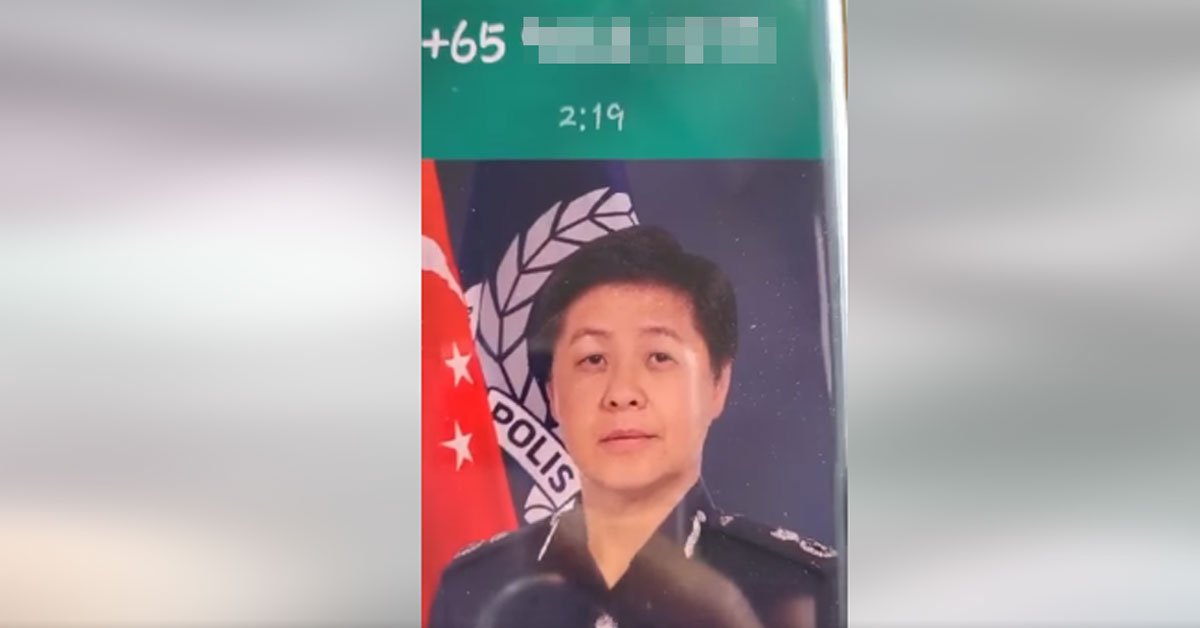In recent years, scammers have really upped their game.
They’re now impersonating government officials and bank employees, and even targeting food delivery personnel.
The authorities have reminded the public to stay vigilant as scams get increasingly sophisticated.
But just like there’s always one group member for a project who doesn’t contribute as much as the rest, there are a few scammers who would probably be better off in another line of work.
Funny Scam Caller Uses Chinese Female SPF Officer Profile Image But Has a Male Voice That Sounds Like an Indian
When you get a call from the police, you’re almost always going to feel a little uneasy, even if you did nothing wrong.
But this woman felt suspicious right from the get-go when she received a call from someone claiming to be from the Criminal Investigations Department (CID).
The caller’s number had a “+65′ prefix”, which already set off alarm bells. But then the caller had trouble spelling his own name.
“Please tell me you are using Mastercard, Visa card, or normal card. Which one you are using?” the caller asked.
Oddly, the caller had a picture of a Chinese female police officer as his display picture, but sounded like a man with an Indian accent. And when asked to pronounce her/his Chinese name, the caller didn’t exactly do a great job.
What’s even more interesting is that the image is of Deputy Commissioner of Police Florence Chua, the first woman who’s appointed CID’s chief and Deputy Commissioner of Police, an extremely high position.
The woman asked the caller to repeat his name several times, which to anyone else would be a rather simple task, but the man grew tired of repeating it and said he could provide his “Singaporean Police ID photo” instead.
“Don’t worry sister, I’m a responsible official from CID department”, he said, which is clearly what a CID officer would say. (He also seems to have forgotten that the ‘D’ in ‘CID’ stands for ‘department’.)
Unconvinced, the woman then asks the caller to spell his name, which, again, should be an easy task. But the caller pauses for a second before saying: “I can tell you the spell name, right?”.
He utters the letters “t’ and “i’ before presumably falling asleep, as he doesn’t say anything for the next five seconds. He once again says he can send his “ID photo” on WhatsApp, which prompts the frustrated woman to mention the obvious: “This is a Chinese name but you sound Indian”.
The man denies it, saying he’s an “English official”.
Exasperated over his several failed attempts to scam the woman, the man tries flinging a menacing threat, saying he will freeze transactions on the woman’s ATM and mobile banking account.
In response, the woman says “Okay, go ahead”, without giving any of her details.
And that is how you deal with a scammer.
Avoiding Scams
The first step in scam prevention is to keep a lookout for the number; numbers with the +65 prefix indicate an overseas call made to look like a local call (normal local calls won’t have the +).
The police have also previously warned the public not to click on any suspicious URL links in unsolicited messages or emails.
Additionally, you should never send money to strangers or people you’ve never met in person before, and, most importantly, never share bank account login credentials with anyone.
You can also watch these videos to the end to learn more about scams in Singapore:

Read Also:
- Man in China Banned from BBQ Buffet Restaurant Because He Eats Too Much
- ‘Prankster’ Ordered Whole Roasted Pig With Cash-on-Delivery to a Malay Man in Tampines
- Joanne Peh Dispels Myth That She’s Pregnant With New IG Post
Featured Image: Facebook (Beh Chia Lor – Singapore Road)
